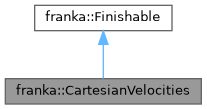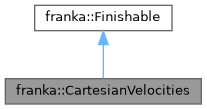Stores values for Cartesian velocity motion generation.
More...
#include <control_types.h>
|
|
std::array< double, 6 > | O_dP_EE {} |
| | Cartesian velocity with respect to the base frame O with \((\dot x, \dot y,
\dot z)\) in \([m/s]\) and \((\omega_x, \omega_y, \omega_z)\) in \([rad/s]\).
|
| |
| std::array< double, 2 > | elbow {} |
| | Elbow configuration.
|
| |
|
bool | motion_finished = false |
| | Determines whether to finish a currently running motion.
|
| |
Stores values for Cartesian velocity motion generation.
The Cartesian velocity of the end-effector is expressed in a frame parallel to the fixed/base frame, whose origin is the same as the end-effector frame. Rotations are thus expressed around the end-effector and parallel to the base frame.
- Examples
- generate_cartesian_velocity_motion.cpp, and generate_cartesian_velocity_motion_external_control_loop.cpp.
◆ CartesianVelocities() [1/4]
| franka::CartesianVelocities::CartesianVelocities |
( |
const std::array< double, 6 > & |
cartesian_velocities | ) |
|
|
noexcept |
Creates a new CartesianVelocities instance.
- Parameters
-
| [in] | cartesian_velocities | Desired Cartesian velocity with respect to the base frame O with \((\dot x, \dot y, \dot z)\) in \([m/s]\) and \((\omega_x,
\omega_y, \omega_z)\) in \([rad/s]\). |
◆ CartesianVelocities() [2/4]
| franka::CartesianVelocities::CartesianVelocities |
( |
const std::array< double, 6 > & |
cartesian_velocities, |
|
|
const std::array< double, 2 > & |
elbow |
|
) |
| |
|
noexcept |
Creates a new CartesianVelocities instance.
- Parameters
-
| [in] | cartesian_velocities | Desired Cartesian velocity with respect to the base frame O with \((\dot x, \dot y, \dot z)\) in \([m/s]\) and \((\omega_x,
\omega_y, \omega_z)\) in \([rad/s]\). |
| [in] | elbow | Elbow configuration (see elbow member for more details). |
◆ CartesianVelocities() [3/4]
| franka::CartesianVelocities::CartesianVelocities |
( |
std::initializer_list< double > |
cartesian_velocities | ) |
|
Creates a new CartesianVelocities instance.
- Parameters
-
| [in] | cartesian_velocities | Desired Cartesian velocity with respect to the base frame O with \((\dot x, \dot y, \dot z)\) in \([m/s]\) and \((\omega_x,
\omega_y, \omega_z)\) in \([rad/s]\). |
- Exceptions
-
| std::invalid_argument | if the given initializer list has an invalid number of arguments. |
◆ CartesianVelocities() [4/4]
| franka::CartesianVelocities::CartesianVelocities |
( |
std::initializer_list< double > |
cartesian_velocities, |
|
|
std::initializer_list< double > |
elbow |
|
) |
| |
Creates a new CartesianVelocities instance.
- Parameters
-
| [in] | cartesian_velocities | Desired Cartesian velocity with respect to the base frame O with \((\dot x, \dot y, \dot z)\) in \([m/s]\) and \((\omega_x,
\omega_y, \omega_z)\) in \([rad/s]\). |
| [in] | elbow | Elbow configuration (see elbow member for more details). |
- Exceptions
-
| std::invalid_argument | if a given initializer list has an invalid number of arguments. |
◆ hasElbow()
| bool franka::CartesianVelocities::hasElbow |
( |
| ) |
const |
|
noexcept |
Determines whether there is a stored elbow configuration.
- Returns
- True if there is a stored elbow configuration, false otherwise.
◆ elbow
| std::array<double, 2> franka::CartesianVelocities::elbow {} |
Elbow configuration.
The values of the array are:
- elbow[0]: Position of the 3rd joint in \([rad]\).
- elbow[1]: Flip direction of the elbow (4th joint):
- +1 if \(q_4 > \alpha\)
- 0 if \(q_4 == \alpha \)
- -1 if \(q_4 < \alpha \)
with \(\alpha = -0.467002423653011\) \(rad\)
The documentation for this class was generated from the following file:




 Public Attributes inherited from franka::Finishable
Public Attributes inherited from franka::Finishable